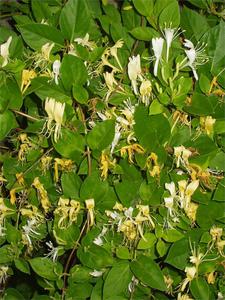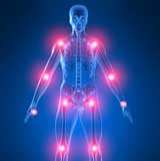
Pinyin: Jin Yin Hua Latin: Lonicera Japonica - Lonicera Flower, Honeysuckle Flower
Physical Characteristics
An evergreen Climber growing to 5m by 5m at a fast rate. It is hardy to zone 4. It is in leaf all year, in flower from June to July. The flowers are hermaphrodite (have both male and female organs) and are pollinated by Moths. The plant prefers light (sandy), medium (loamy) and heavy (clay) soils. The plant prefers acid, neutral and basic (alkaline) soils. It can grow in semi-shade (light woodland) or no shade. It requires dry or moist soil.
Family
Edible Uses*
Edible Parts: Flowers; Leaves. Edible Uses: Tea. Leaves - cooked. The parboiled leaves are used as a vegetable. Some caution is advised, see notes above on toxicity. Flowers - sucked for their sweet nectar, used as a vegetable or made into a syrup and puddings. A tea is made from the leaves, buds and flowers.*
Traditional Chinese Medicinal (TCM) Uses*
Antibacterial; Antiinflammatory; Antispasmodic; Antiviral; Depurative; Diuretic; Febrifuge; Skin; TB; VD. The stems and flower buds are alterative, antibacterial, anti-inflammatory, antispasmodic, depurative, diuretic, febrifuge. The plant is also used to reduce blood pressure. The stems are used internally in the treatment of acute rheumatoid arthritis, mumps and hepatitis. The stems are harvested in the autumn and winter, and are dried for later use. The stems and flowers are used together as an infusion in the treatment of upper respiratory tract infections (including pneumonia) and dysentery.*
An infusion of the flower buds is used in the treatment of a wide range of ailments including syphilitic skin diseases and tumours, bacterial dysentery, colds, enteritis, pain and swellings. Experimentally, the flower extracts have been shown to lower blood cholesterol levels and are antibacterial, antiviral and tuberculostatic. Externally, the flowers are applied as a wash to skin inflammations, infectious rashes and sores. The flowers are harvested in early morning before they open and are dried for later use. The plant has a similar action to Forsythia suspensa and is usually used in combination with that species to achieve a stronger action. This plant has become a serious weed in many areas of N. America, it might have the potential to be utilized for proven medical purposes.*
Other Uses*
Basketry; Ground cover; Insecticide. A very vigorous climbing plant, it makes a good dense ground cover plant where it has the space to run over the ground but it will swamp smaller plants. The sub-species L. japonica repens is especially used for this purpose on the continent. The cultivar 'Halliana' has also been recommended. This cultivar should be clipped back severely in the spring if it gets untidy, it responds well to such conditions. Plants should be spaced about 1 metre apart each way. The plant is said to be insecticidal. The stems have been used in making baskets.*
References
Source: Lonicera Japonica Flower Plants For A Future, England 1996-2008.
This work is licensed under a Creative Commons License.
Natural dietary supplements are designed to offer the body support to promote health, harmony, balance and overall well being.*

 Get Well Natural, LLC
Get Well Natural, LLC  Kidney Function & Regeneration Health
Kidney Function & Regeneration Health  Platelet & Blood Cell Health
Platelet & Blood Cell Health  Prostate, Flow & Function Health
Prostate, Flow & Function Health  General Mind & Body Health
General Mind & Body Health  Heart, Cholesterol & Cardio Health
Heart, Cholesterol & Cardio Health  Allergy-Free Body
Allergy-Free Body  Anxiety & Stress
Anxiety & Stress  Blood Platelet Counts & Function
Blood Platelet Counts & Function  Blood Pressure Health
Blood Pressure Health  Kidney Function Health
Kidney Function Health  Immune System Health & Balance
Immune System Health & Balance  Prostate & Urinary Health Function
Prostate & Urinary Health Function  Blood Sugar Balance
Blood Sugar Balance  Cardiovascular Heart Health
Cardiovascular Heart Health  Detoxification & Healthy Cells
Detoxification & Healthy Cells  Women's Health
Women's Health  Liver Regeneration
Liver Regeneration  Pain-Free Body
Pain-Free Body  Water & Air Filtration
Water & Air Filtration 


